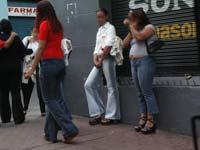‘Signal To Pimps That They Are Welcome To Conduct Business’

A US-based Coalition Against Trafficking in Women has warned that an Ontario Supreme Court ruling that voided Canada’s anti-prostitution laws and a similar challenge in British Columbia will support sex traffickers.
In a statement issued 30 days before the ruling becomes final, the CATW said while the Court asserts the “ruling will lead to greater safety for women in prostitution,…this decision, to the contrary, is certain to put even more women and girls at risk.”
“It is premised on false notions and is seriously at odds with Canada’s respected human rights record.”
The 132-page ruling by Ontario Superior Court Judge Susan Himel last month addressed Canada’s “law on prostitution, as presently constituted, …[as having] not achieved what is presumably its theoretical object, that of reducing prostitution (or even of controlling it within manageable limits).”
“Moreover, it operates in a way which victimizes and dehumanizes the prostitute. Change in the law is, in our opinion, clearly needed.”
In the wake of the Ontario ruling, the British Columbia Appeals Court said the challenge on the laws governing prostitution will go forward.
Retired Vancouver prostitute Sheryl Kiselbach and an umbrella group representing several sex workers can now go forward in their attempt to strike three laws surrounding prostitution from the criminal code on constitutional grounds in hopes of creating safer working environments.
“One of the biggest things that would come out of this is that sex workers are going to be more able to report violence to police without any consequences or repercussions,” said Kiselbach, 59, who worked in the sex industry for 30 years. “That to me is a really big step because it gives them power and takes away power from predators.”
In December 2008, the B.C. Supreme Court accepted a federal government argument to have Kiselbach’s case thrown out because only active sex workers could challenge the laws. Working prostitutes represented by the Downtown Eastside Sex Workers United Against Violence Society were not named as plaintiffs.
Defence lawyer Katrina Pacey said the decision afforded the marginalized group greater access to the court system.
“We know it’s incredibly important when people feel that laws are affecting them and affecting their rights,” she said.
The group wants to strike laws surrounding communicating for the purpose of prostitution, keeping a bawdy house and procuring.
But CATW said that “decriminalizing prostitution sends an unmistakable signal to pimps and human traffickers that they are welcome to conduct ‘business’ in Canada.”
“This is an especially dangerous message to send at a time when human trafficking is now tied with illegal arms sales as the leading source of criminal earnings in the world. Countries that have legalized prostitution have witnessed a dramatic increase in both the demand for prostitution and the incidence of sex trafficking it fuels.”
However, Himel said in her ruling that the experts from CATW offered to her court “had entered the realm of advocacy and had given evidence in a manner that was designed to persuade rather than assist the court.”
“While it is natural for persons immersed in a field of study to begin to take positions as a result of their research over time, where these witnesses act primarily as advocates, their opinions are of lesser value to the court.”
On the other hand, Himel noted that she found “sufficient evidence from other experts and government reports to conclude that the applicants [led by dominatrix Terri Jean Bedford] have proven on a balance of probabilities that the impugned provisions sufficiently contribute to a deprivation of their security of the person.”
But CATW said that “prostitution is a practice of sex discrimination that targets girls and women for abuse.”
“It is a social injustice stemming from and perpetuating the world’s oldest inequality, that of women. It is also inextricably linked to sex trafficking.
Decriminalization of prostitution ignores the underlying social inequalities that give rise to sexual exploitation and is fundamentally at odds with the goal of human equality.”
CATW said the “most effective way to address this injustice is to create the legal, political and social conditions that give women alternatives to prostitution rather than working to keep them in the sex industry.”
The group urged Canada to “decriminalize the women in prostitution and address the demand for prostitution by penalizing the buyers instead of paving the way for men to purchase women and children.”
CATW said it sees adopting the Nordic Model, originated in Sweden, and passed in other countries such as Norway, Iceland, the Philippines and South Korea, as a “good start”.
The Philippines remains on the Tier 2 Watch List of the United States State Department “for the second consecutive year”.
The State Department’s Trafficking in Persons report for 2010 noted that Filipino women are trafficked to Malaysia, Singapore, Hong Kong, South Korea, Japan, and various Middle Eastern countries.
On the other hand, the report also noted that trafficking victims in Canada also come from the Philippines.
“Canada is a source, transit, and destination country for men, women, and children subjected to trafficking in persons, specifically forced prostitution and, to a lesser extent, forced labor. Canadian women and girls, particularly from aboriginal communities, are found in conditions of commercial sexual exploitation across the country.”
Still, the report released before August placed Canada as a Tier 1 country, or “whose governments fully comply with the Trafficking Victims Protection Act’s minimum standards.”
- Agencies and Inquirer









